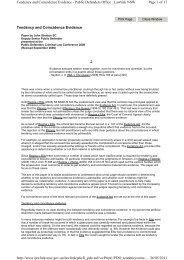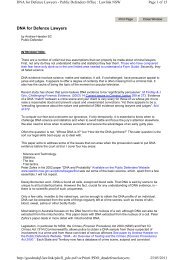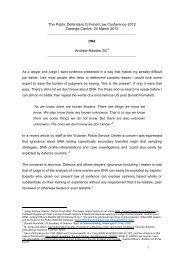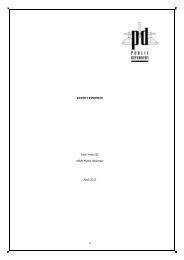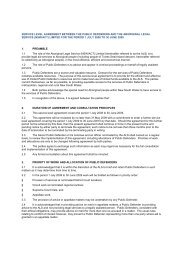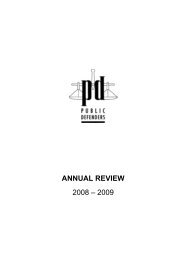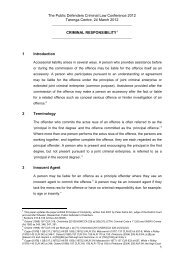Right to Silence: inferences from silence - The Public Defenders
Right to Silence: inferences from silence - The Public Defenders
Right to Silence: inferences from silence - The Public Defenders
Create successful ePaper yourself
Turn your PDF publications into a flip-book with our unique Google optimized e-Paper software.
What happens in practice is that the trial Judge invites both the Prosecution and<br />
Defence trial advocates <strong>to</strong> address him/her on the following:<br />
(1) Do the Prosecution invite the court <strong>to</strong> draw adverse <strong>inferences</strong> <strong>from</strong> pre-trial<br />
and trial defendant <strong>silence</strong>?<br />
(2) If so, on what basis.<br />
(3) Any counter arguments <strong>from</strong> the Defence.<br />
(4) Ruling on the applicability of an inference direction.<br />
(5) Counsel’s suggestions as <strong>to</strong> any tailoring of the JSB specimen directions.<br />
Failure <strong>to</strong> give a proper direction will not, however, necessarily involve a breach of<br />
Article 6 for ECHR Strasbourg purposes, nor render a conviction unsafe in the<br />
domestic English appellant court.<br />
In Chenia, the fac<strong>to</strong>rs which persuaded the court that C had received a fair trial included the<br />
strength of the evidence, the fact that his failure <strong>to</strong> mention relevant facts was not<br />
consequent upon legal advice and the clear and accurate direction given on the failure <strong>to</strong><br />
give evidence in the case.<br />
In relation <strong>to</strong> access <strong>to</strong> Legal Advice, section 34(2A) of the CJPO 1994 was added by<br />
s.58 YJCEA 1999, <strong>to</strong> bring the law in<strong>to</strong> line with the judgment of the European Court of<br />
Human <strong>Right</strong>s in Murray v UK (1996) 22 EHRR 29. <strong>The</strong> court considered that even the<br />
lawful exercise of a power <strong>to</strong> delay access <strong>to</strong> legal advice could, where the accused was at<br />
risk of adverse <strong>inferences</strong> under the statu<strong>to</strong>ry scheme, be sufficient <strong>to</strong> deprive the accused<br />
of a fair procedure under Article 6. <strong>The</strong> accused was faced with a ‘fundamental dilemma’<br />
at the outset of the investigation, in that his <strong>silence</strong> might lead <strong>to</strong> adverse <strong>inferences</strong><br />
being drawn against him, while breaking his <strong>silence</strong> might prejudice his defence<br />
without necessarily removing the possibility of <strong>inferences</strong> being drawn against him.<br />
Under the amended scheme, the dilemma is resolved by postponing the prospect that<br />
<strong>inferences</strong> will be drawn until the accused has had the option of consulting with a<br />
legal adviser. <strong>The</strong> postponement occurs in exactly the same way whether access <strong>to</strong> legal<br />
advice is delayed lawfully or unlawfully. An ‘authorised place of detention’ is defined by s.<br />
38(2A) <strong>to</strong> include police stations and any other place prescribed by order. <strong>The</strong> caution <strong>to</strong> be<br />
given <strong>to</strong> a person <strong>to</strong> whom a restriction on drawing <strong>inferences</strong> applies is specified by PACE<br />
Code C, annex C.<br />
No conviction wholly or mainly on <strong>silence</strong><br />
Section 38 Criminal Justice and <strong>Public</strong> Order Act 1994<br />
(3) A person shall not have the proceedings against him transferred <strong>to</strong> the Crown<br />
Court for trial, have a case <strong>to</strong> answer or be convicted of an offence solely on an<br />
inference drawn <strong>from</strong> such a failure or refusal as is mentioned in section 34(2),<br />
35(3), 36(2) or 37(2).<br />
(4) A judge shall not refuse <strong>to</strong> grant such an application as is mentioned in section<br />
34(2)(b), 36(2)(b) and 37(2)(b) solely on an inference drawn <strong>from</strong> such a failure as is<br />
mentioned in section 34(2), 36(2) or 37(2).<br />
Colin Wells July 2013 Page 6



